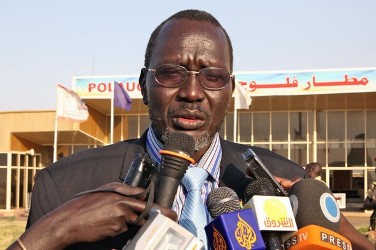South Sudan wants 100% tax levied on alcohol
October 19, 2016 (JUBA) – South Sudan will levy a 100 per cent tax on alcoholic products in the proposed 2016/2017 financial budget.

“We will increase excise [duty taxes] on alcohol from 50% to 100% and tobacco from 30% to 50%. This tax on luxury [goods] will improve health,” Stephen Dhieu Dau told Parliament on Tuesday.
South Sudan fiscal year 2015/16 expired three months ago, but government was not able to prepare a new budget for 2016/2017.
However, the country’s lawmakers now need at least one month to study the proposed resource envelope of SSP 22 billion. With inflation at more than 700%, SSP 22 billion is less than half a billion U.S dollars.
According to the finance minister, there will be financial deficit of $225 million, which translates into inability to raise 40% of the proposed budget to fund government for the next 12 months.
Dhieu also warned against borrowing from the country’s Central Bank, which involves printing more cash to meet the financial gaps.
“We need to stop borrowing from the Central Bank of South Sudan in order to bring inflation down and prevent further depreciation of the currency and reduction of households’ incomes,” he said.
The minister admitted that the current inflation in the country was “impossible to overstate the gravity, but called for operating within the limited ability to prevent severe depreciation and further conflict.
“As government we have run down of our foreign reserves and servings and we have limited ability to prevent the severe depreciation we have seen,” Dhieu told lawmakers.
He proposed tougher measures against individuals siphoning taxes, but did not elaborate on how government intends to undertake this.
South Sudan depends on oil revenues for more than 90% of its annual budget.
According to the finance minister, increasing taxes of non-oil revenues such as alcohol, tobacco and reducing government expenditure, will boost the young nation’s economic outlook.
Telecommunication companies in South Sudan will now pay at least 50% of taxes.
Meanwhile, the finance minister has proposed a departure tax of $20 per person on international travels at the airport, emphasising that long term economic stability requires peace in the country.
“Improving security, transparency, and infrastructure will incentivize the development of our mining, forestry and agriculture sectors,” he said.
Dhieu further disclosed that donors were unwilling to support the budget in absence of full implementation of the peace agreement.
“We require external support to help our country (…), however, our international partners have made it clear that external support will not be offered without peace and economic reforms,” he said.
The peace agreement signed in August 2015 hangs in balance after renewed violence in July forced the armed opposition leader, Riek Machar to flee the country. Machar was replaced by former peace negotiator Taban Deng Gai, a move the former said was “illegal”.
(ST)
